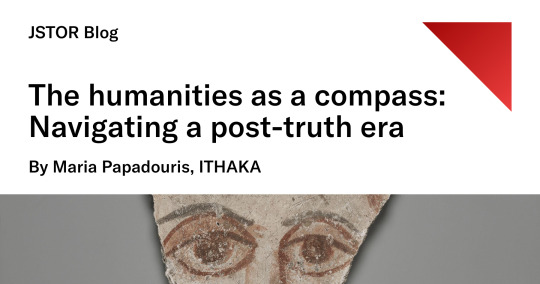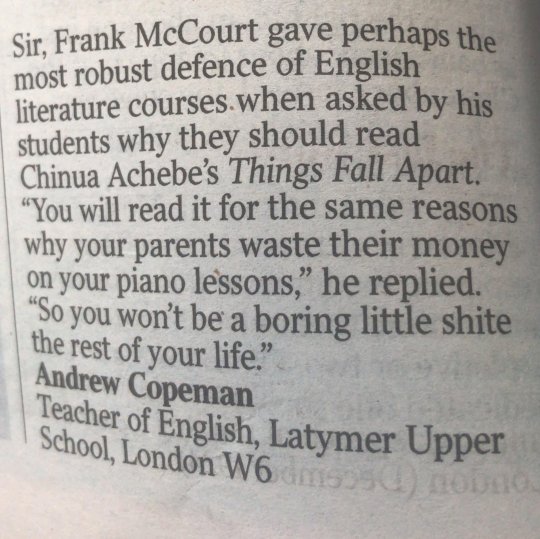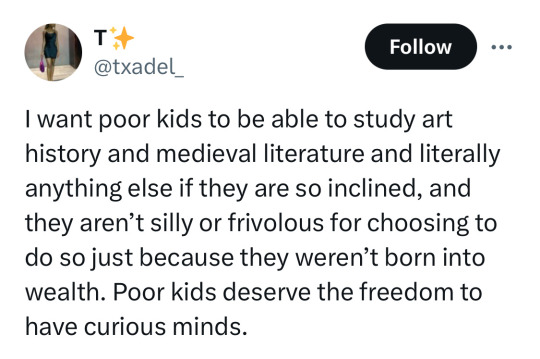#Humanities
Explore tagged Tumblr posts
Text

In a post-truth world, where emotional appeal sometimes drowns out factual accuracy, the humanities are our compass. They help us question the narratives we’re presented with, cultivate empathy, and dig deeper into the layers of truth behind media, politics, and culture.
By embracing literature, history, and the arts, we enhance our critical thinking and foster a connection to the human stories that shape our collective experience. 💭
Check out our latest blog post on how the humanities equip us to navigate the complexities of a world filled with conflicting truths.
#jstor#jstor blog#humanities#literature#history#the arts#social sciences#culture#politics#media#post-truth
1K notes
·
View notes
Text


8/100 days of productivity!
Date: 4/14/25
Pretty good day although I can't wait for this semester to be over!!
☀ Morning ▸booked hotel for NYC trip this summer ▸gym - full-body strength training
🌿 Afternoon ▸read Linda Williams's "Film Bodies: Gender, Genre, and Excess" ▸ re-read Sontag's "Fascinating Fascism" ▸felt low-energy and went home early
🌙 Evening ▸ re-watched Cabaret (1972) - looking forward to writing my paper on it!!▸chat with J tonight
#100 days of productivity#100 dop#studyblr#gradblr#phdblr#humanities#english literature#dark academia#light academia#chaotic academia
17 notes
·
View notes
Text

Julien Baker, Loss Protocol
#aesthetic#dark academia#coffee#art#books#academia#college#light academia#literature#studyblr#poets#poetry#writing#writers#human#humanities#artists#the arts#painting#acting#dancing#singing#design
1K notes
·
View notes
Text
I fully understand why "character A is astounded at the sight of character B's penis" is a specific kink that gets tagged for, but the fact that some platforms choose to tag this kink as "penis awe" is unintentionally very funny. Now I'm picturing penis experience kink tags for all those other allegedly transcendent emotions in the glossary of your Philosophy 101 textbook. Penis faith. Penis Weltschmerz. Penis apprehension of the absurd.
#media#fandom#fanfic#fanart#humanities#philosophy#tagging#penis mention#penis angst being here omitted because most of this blog's followers already know how that one works
29K notes
·
View notes
Quote
The humanities give us a chance to read across languages and cultural differences in order to understand the vast range of perspectives in and on this world. How else can we imagine living together without this ability to see beyond where we are, to find ourselves linked with others we have never directly known, and to understand that, in some abiding and urgent sense, we share a world?
Judith Butler, "McGill University commencement address", 2013
#philosophy#quotes#Judith Butler#McGill University commencement address 2013#education#humanities#awareness#humanity
195 notes
·
View notes
Text







16K notes
·
View notes
Text
I love you people going into "useless" fields I love you classics majors I love you cultural studies majors I love you comparative literature majors I love you film studies majors I love you near eastern religions majors I love you Greek, Latin, and Hebrew majors I love you ethnic studies I love you people going into any and all small field that isn't considered lucrative in our rotting capitalist society please never stop keeping the sacred flame of knowledge for the sake of knowledge and understanding humanity and not merely for the sake of money alive
#classics#mythology#ancient greek mythology#ancient roman mythology#comparative literature#latin#hebrew#ethnic studies#fuck capitalism#communism#i love my useless degree idc#academia#university#dark academia#Greek#philosophy#liberal arts#humanities#women and gender studies#cultural anthropology
46K notes
·
View notes
Text
"I believe that humanity is meant to thrive and flourish, and that doesn't happen without context. And the arts and the humanities? They are our vessel for context." - LeVar Burton
#levar burton#humanities#art#music#education#history#national humanities medal#national endowment for the humanities
7K notes
·
View notes
Text

#gradblr#phdblr#phd#student#studyblr#research#dark academia#light academia#booklr#studyinspo#study space#humanities#stem#studyblog#book blog#twitter
4K notes
·
View notes
Text


10K notes
·
View notes
Text

And a reminder that higher education cannot be considered truly democratised if students can still be doomed to poverty with multiple or advanced arts and Humanities degrees...
#poc dark academia#dark academia#higher education#dark academia books#dark academia blog#dark academism#studyblr#studyspo#humanities#university#college#systemic oppression#elitism#classism#artists#liberal arts#grad school#college student#education
2K notes
·
View notes
Text
Can we talk about how the idea that STEM and the humanities are mortal enemies with no overlap is actually incredibly harmful and is not only preventing people from pursuing their passions but also part of the reason why the humanities aren’t given their proper respect? No, artists are not all snobby pretentious assholes who think they’re more cultured than everyone else and no scientists are not all emotionless robots who think they’re smarter than everyone else and it’s possible to be an artist and a scientist at the same time. By acting like you have to choose between STEM and humanities we are eliminating thousands of potential careers and causing unnecessary divisions in a time where nothing is more crucial than unity. I’m so tired of people acting like STEM majors are incapable of understanding art and humanities majors are incapable of understanding math when the two fields are crucial to one another. Who would design our architecture if it weren’t for artful engineers? Who would discover the rules of composition? At the end of the day we are all just people trying to learn and make a living, and all of these careers are important to humanity. People can’t say that STEM is more important than humanities if there’s no such thing as STEM vs humanities.
#college#university#career#politics#philosophy#education#stemblr#women in stem#stem academia#stem student#art#artists on tumblr#humanities#music#literature#opinion
428 notes
·
View notes
Text

🎃 Ever wonder how Frankenstein and The Vampyre came to life? It all began during the stormy summer of 1816, a time so eerie it’s now called the "Year Without a Summer." Confined indoors by relentless rain, Mary Shelley, Lord Byron, and John Polidori challenged each other to write the scariest story they could. What followed was nothing short of legendary: Shelley’s Frankenstein—a tale of ambition, creation, and consequence—and Polidori’s The Vampyre, the first modern vampire story that still haunts us today.
These works explore themes we still grapple with—ambition, relationships, power, and the unknown. And they remind us of what the humanities do best: helping us ask the big questions about who we are and how we live together.
This Halloween, revisit these iconic stories and reflect on how literature challenges us to confront our fears—both real and imagined. Check out our latest blog post to explore the spirit of Villa Diodati and the enduring importance of these tales.
Read it now on the JSTOR blog.
#jstor#jstor blog#humanities#social sciences#literature#gothic literature#frankenstein#the vampyre#mary shelley#john polidori#lord byron#classic lit
850 notes
·
View notes
Text
It is my solemn duty to inform you that reddit came out with a banger

252 notes
·
View notes
Text
I feel like 90% of "ancient curses" are probably adequately explained by the fact that the self-proclaimed adventurers who ostensibly fell victim to them were, as a class, a bunch of dipshits who engaged in frequent international travel in an era before antibiotics and vaccines. Like, the list of novel pathogens these guys were risking exposure to on a regular basis was effectively "all of them". That's gotta leave a mark.
12K notes
·
View notes